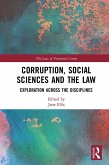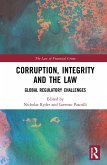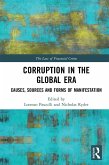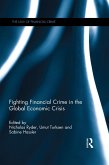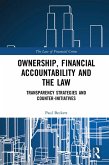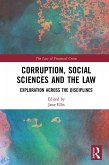Corruption, Integrity and the Law (eBook, ePUB)
Global Regulatory Challenges
Redaktion: Ryder, Nicholas; Pasculli, Lorenzo
42,95 €
42,95 €
inkl. MwSt.
Sofort per Download lieferbar

21 °P sammeln
42,95 €
Als Download kaufen

42,95 €
inkl. MwSt.
Sofort per Download lieferbar

21 °P sammeln
Jetzt verschenken
Alle Infos zum eBook verschenken
42,95 €
inkl. MwSt.
Sofort per Download lieferbar
Alle Infos zum eBook verschenken

21 °P sammeln
Corruption, Integrity and the Law (eBook, ePUB)
Global Regulatory Challenges
Redaktion: Ryder, Nicholas; Pasculli, Lorenzo
- Format: ePub
- Merkliste
- Auf die Merkliste
- Bewerten Bewerten
- Teilen
- Produkt teilen
- Produkterinnerung
- Produkterinnerung

Bitte loggen Sie sich zunächst in Ihr Kundenkonto ein oder registrieren Sie sich bei
bücher.de, um das eBook-Abo tolino select nutzen zu können.
Hier können Sie sich einloggen
Hier können Sie sich einloggen
Sie sind bereits eingeloggt. Klicken Sie auf 2. tolino select Abo, um fortzufahren.

Bitte loggen Sie sich zunächst in Ihr Kundenkonto ein oder registrieren Sie sich bei bücher.de, um das eBook-Abo tolino select nutzen zu können.
This book provides a unique interdisciplinary assessment of the global anti-corruption legal framework. It gathers top experts in different fields of both the academic and the professional world to analyse legal instruments in the attempt of establishing an interdisciplinary and comparative dialogue between theory and practice.
- Geräte: eReader
- mit Kopierschutz
- eBook Hilfe
Andere Kunden interessierten sich auch für
![Corruption, Social Sciences and the Law (eBook, ePUB) Corruption, Social Sciences and the Law (eBook, ePUB)]() Corruption, Social Sciences and the Law (eBook, ePUB)45,95 €
Corruption, Social Sciences and the Law (eBook, ePUB)45,95 €![Corruption, Integrity and the Law (eBook, PDF) Corruption, Integrity and the Law (eBook, PDF)]() Corruption, Integrity and the Law (eBook, PDF)42,95 €
Corruption, Integrity and the Law (eBook, PDF)42,95 €![Corruption in the Global Era (eBook, ePUB) Corruption in the Global Era (eBook, ePUB)]() Corruption in the Global Era (eBook, ePUB)45,95 €
Corruption in the Global Era (eBook, ePUB)45,95 €![Fighting Financial Crime in the Global Economic Crisis (eBook, ePUB) Fighting Financial Crime in the Global Economic Crisis (eBook, ePUB)]() Fighting Financial Crime in the Global Economic Crisis (eBook, ePUB)52,95 €
Fighting Financial Crime in the Global Economic Crisis (eBook, ePUB)52,95 €![Ownership, Financial Accountability and the Law (eBook, ePUB) Ownership, Financial Accountability and the Law (eBook, ePUB)]() Paul BeckettOwnership, Financial Accountability and the Law (eBook, ePUB)42,95 €
Paul BeckettOwnership, Financial Accountability and the Law (eBook, ePUB)42,95 €![Corruption, Social Sciences and the Law (eBook, PDF) Corruption, Social Sciences and the Law (eBook, PDF)]() Corruption, Social Sciences and the Law (eBook, PDF)45,95 €
Corruption, Social Sciences and the Law (eBook, PDF)45,95 €![The Financial War on Terrorism (eBook, ePUB) The Financial War on Terrorism (eBook, ePUB)]() Nicholas RyderThe Financial War on Terrorism (eBook, ePUB)52,95 €
Nicholas RyderThe Financial War on Terrorism (eBook, ePUB)52,95 €-
-
-
This book provides a unique interdisciplinary assessment of the global anti-corruption legal framework. It gathers top experts in different fields of both the academic and the professional world to analyse legal instruments in the attempt of establishing an interdisciplinary and comparative dialogue between theory and practice.
Hinweis: Dieser Artikel kann nur an eine deutsche Lieferadresse ausgeliefert werden.
Dieser Download kann aus rechtlichen Gründen nur mit Rechnungsadresse in A, B, BG, CY, CZ, D, DK, EW, E, FIN, F, GR, HR, H, IRL, I, LT, L, LR, M, NL, PL, P, R, S, SLO, SK ausgeliefert werden.
Hinweis: Dieser Artikel kann nur an eine deutsche Lieferadresse ausgeliefert werden.
Produktdetails
- Produktdetails
- Verlag: Taylor & Francis eBooks
- Seitenzahl: 332
- Erscheinungstermin: 11. Februar 2020
- Englisch
- ISBN-13: 9781000028683
- Artikelnr.: 58646600
- Verlag: Taylor & Francis eBooks
- Seitenzahl: 332
- Erscheinungstermin: 11. Februar 2020
- Englisch
- ISBN-13: 9781000028683
- Artikelnr.: 58646600
- Herstellerkennzeichnung Die Herstellerinformationen sind derzeit nicht verfügbar.
Nicholas Ryder is a professor in Financial Crime, Head of Research and Head of the Global Crime, Justice and Security Research Group at Bristol Law School, University of the West of England, Bristol, UK. Lorenzo Pasculli is Associate Head of School for Research at Coventry Law School and an associate of the Centre for Financial and Corporate Integrity at Coventry University, UK. He is also a visiting professor at Nebrija University, Spain.
PART I: Introduction: the global anti-corruption framework;
1 The future of anti-corruption: towards a global system of prevention and
justice;
Lorenzo Pasculli and Nicholas Ryder;
PART II: Criminal justice: international and national frameworks;
2 The fight against international corruption: a call for a global approach
in corporate criminal liability law and procedure;
Maria Lucia di Bitonto and Gaetano Galluccio Mezio;
3 What role does competition law have to play in the prosecution of
financial crime in the UK?;
Diana Johnson;
4 The contrast to corruption in the Italian legal system between repression
and prevention;
Debora Provolo;
PART III: The escape from criminal law: deferred prosecutions agreements
and financial sanctions;
5 Corruption, regulation and the law: the power not to prosecute under the
UK Bribery Act 2010;
Shahrzad Fouladvand;
6 Justice deferred is Justice denied? The Jury's out;
Axel Palmer;
7 Deferred prosecution agreements and the restorative justice paradigm:
justice restored or corporate cop out?;
Darren McStravick;
8 Financial sanctions as a weapon for combatting grand corruption;
Anna Bradshaw;
PART IV: Information as evidence: whistle-blowing;
9 Vulnerabilities, obstacles and risks in reporting financial crimes:
conundrum of whistle-blowers;
Alison Lui and Umut Turksen;
10 Keep the canaries singing. Are whistle-blowers in Nigeria adequately
protected?;
Alison Lui and Soji Apampa;
PART V: Information as integrity: bank secrecy and non-financial reporting;
11 'Follow-ing the money' ten years on: transparency and the fight against
banking secrecy;
Elena Blanco and Miguel J. Arjona-Sánchez;
12 Information, power, and the fight against tax havens;
Stuart Maclennan;
13 The communication of non-financial information according to the
Directive 2014/95/EU as an instrument for the promotion of corporate
integrity in Europe;
Marco Cristiano Petrassi;
PART VI: Beyond ethical codes: reshaping culture and values;
14 The fight and prevention against corruption: the case of Switzerland and
implications for Swiss firms with business activities abroad;
Giang Ly Isenring;
15 The practice of anticorruption and integrity of government. On the moral
learning side of the story;
Julien Topal;
16 Ethical integration in EU Law: the prevailing normative theories in EGE
opinions;
Matthias Pirs and Markus Frischhut;
1 The future of anti-corruption: towards a global system of prevention and
justice;
Lorenzo Pasculli and Nicholas Ryder;
PART II: Criminal justice: international and national frameworks;
2 The fight against international corruption: a call for a global approach
in corporate criminal liability law and procedure;
Maria Lucia di Bitonto and Gaetano Galluccio Mezio;
3 What role does competition law have to play in the prosecution of
financial crime in the UK?;
Diana Johnson;
4 The contrast to corruption in the Italian legal system between repression
and prevention;
Debora Provolo;
PART III: The escape from criminal law: deferred prosecutions agreements
and financial sanctions;
5 Corruption, regulation and the law: the power not to prosecute under the
UK Bribery Act 2010;
Shahrzad Fouladvand;
6 Justice deferred is Justice denied? The Jury's out;
Axel Palmer;
7 Deferred prosecution agreements and the restorative justice paradigm:
justice restored or corporate cop out?;
Darren McStravick;
8 Financial sanctions as a weapon for combatting grand corruption;
Anna Bradshaw;
PART IV: Information as evidence: whistle-blowing;
9 Vulnerabilities, obstacles and risks in reporting financial crimes:
conundrum of whistle-blowers;
Alison Lui and Umut Turksen;
10 Keep the canaries singing. Are whistle-blowers in Nigeria adequately
protected?;
Alison Lui and Soji Apampa;
PART V: Information as integrity: bank secrecy and non-financial reporting;
11 'Follow-ing the money' ten years on: transparency and the fight against
banking secrecy;
Elena Blanco and Miguel J. Arjona-Sánchez;
12 Information, power, and the fight against tax havens;
Stuart Maclennan;
13 The communication of non-financial information according to the
Directive 2014/95/EU as an instrument for the promotion of corporate
integrity in Europe;
Marco Cristiano Petrassi;
PART VI: Beyond ethical codes: reshaping culture and values;
14 The fight and prevention against corruption: the case of Switzerland and
implications for Swiss firms with business activities abroad;
Giang Ly Isenring;
15 The practice of anticorruption and integrity of government. On the moral
learning side of the story;
Julien Topal;
16 Ethical integration in EU Law: the prevailing normative theories in EGE
opinions;
Matthias Pirs and Markus Frischhut;
PART I: Introduction: the global anti-corruption framework;
1 The future of anti-corruption: towards a global system of prevention and
justice;
Lorenzo Pasculli and Nicholas Ryder;
PART II: Criminal justice: international and national frameworks;
2 The fight against international corruption: a call for a global approach
in corporate criminal liability law and procedure;
Maria Lucia di Bitonto and Gaetano Galluccio Mezio;
3 What role does competition law have to play in the prosecution of
financial crime in the UK?;
Diana Johnson;
4 The contrast to corruption in the Italian legal system between repression
and prevention;
Debora Provolo;
PART III: The escape from criminal law: deferred prosecutions agreements
and financial sanctions;
5 Corruption, regulation and the law: the power not to prosecute under the
UK Bribery Act 2010;
Shahrzad Fouladvand;
6 Justice deferred is Justice denied? The Jury's out;
Axel Palmer;
7 Deferred prosecution agreements and the restorative justice paradigm:
justice restored or corporate cop out?;
Darren McStravick;
8 Financial sanctions as a weapon for combatting grand corruption;
Anna Bradshaw;
PART IV: Information as evidence: whistle-blowing;
9 Vulnerabilities, obstacles and risks in reporting financial crimes:
conundrum of whistle-blowers;
Alison Lui and Umut Turksen;
10 Keep the canaries singing. Are whistle-blowers in Nigeria adequately
protected?;
Alison Lui and Soji Apampa;
PART V: Information as integrity: bank secrecy and non-financial reporting;
11 'Follow-ing the money' ten years on: transparency and the fight against
banking secrecy;
Elena Blanco and Miguel J. Arjona-Sánchez;
12 Information, power, and the fight against tax havens;
Stuart Maclennan;
13 The communication of non-financial information according to the
Directive 2014/95/EU as an instrument for the promotion of corporate
integrity in Europe;
Marco Cristiano Petrassi;
PART VI: Beyond ethical codes: reshaping culture and values;
14 The fight and prevention against corruption: the case of Switzerland and
implications for Swiss firms with business activities abroad;
Giang Ly Isenring;
15 The practice of anticorruption and integrity of government. On the moral
learning side of the story;
Julien Topal;
16 Ethical integration in EU Law: the prevailing normative theories in EGE
opinions;
Matthias Pirs and Markus Frischhut;
1 The future of anti-corruption: towards a global system of prevention and
justice;
Lorenzo Pasculli and Nicholas Ryder;
PART II: Criminal justice: international and national frameworks;
2 The fight against international corruption: a call for a global approach
in corporate criminal liability law and procedure;
Maria Lucia di Bitonto and Gaetano Galluccio Mezio;
3 What role does competition law have to play in the prosecution of
financial crime in the UK?;
Diana Johnson;
4 The contrast to corruption in the Italian legal system between repression
and prevention;
Debora Provolo;
PART III: The escape from criminal law: deferred prosecutions agreements
and financial sanctions;
5 Corruption, regulation and the law: the power not to prosecute under the
UK Bribery Act 2010;
Shahrzad Fouladvand;
6 Justice deferred is Justice denied? The Jury's out;
Axel Palmer;
7 Deferred prosecution agreements and the restorative justice paradigm:
justice restored or corporate cop out?;
Darren McStravick;
8 Financial sanctions as a weapon for combatting grand corruption;
Anna Bradshaw;
PART IV: Information as evidence: whistle-blowing;
9 Vulnerabilities, obstacles and risks in reporting financial crimes:
conundrum of whistle-blowers;
Alison Lui and Umut Turksen;
10 Keep the canaries singing. Are whistle-blowers in Nigeria adequately
protected?;
Alison Lui and Soji Apampa;
PART V: Information as integrity: bank secrecy and non-financial reporting;
11 'Follow-ing the money' ten years on: transparency and the fight against
banking secrecy;
Elena Blanco and Miguel J. Arjona-Sánchez;
12 Information, power, and the fight against tax havens;
Stuart Maclennan;
13 The communication of non-financial information according to the
Directive 2014/95/EU as an instrument for the promotion of corporate
integrity in Europe;
Marco Cristiano Petrassi;
PART VI: Beyond ethical codes: reshaping culture and values;
14 The fight and prevention against corruption: the case of Switzerland and
implications for Swiss firms with business activities abroad;
Giang Ly Isenring;
15 The practice of anticorruption and integrity of government. On the moral
learning side of the story;
Julien Topal;
16 Ethical integration in EU Law: the prevailing normative theories in EGE
opinions;
Matthias Pirs and Markus Frischhut;

